高中英语语法情态动词专题(精辟)
高中英语知识点归纳语法情态动词的运用

高中英语知识点归纳语法情态动词的运用高中英语知识点归纳:语法情态动词的运用高中英语中,语法知识点千变万化,其中一个重要的部分就是情态动词的运用。
掌握了情态动词的用法,可以帮助我们更准确地表达自己的意思,提升英语写作和口语表达能力。
本文将对高中英语中常见的情态动词进行归纳总结,并分别从推测、建议、允许、请求和义务五个方面进行讲解。
一、推测(speculation)1. must"must"表示推测时,常用于对现在情况进行推理,表示事物发生的可能性很大。
例如:He must be at home. (他肯定在家。
)2. might"might"是"may"的过去时态形式,表示推测时,表示事物发生的可能性较小。
例如:He might be at home. (他可能在家。
)3. could"could"表示推测时,表示事物发生的可能性较小。
例如:He could be at home. (他可能在家。
)4. can't"can't"表示推测时,表示肯定事物不可能发生。
例如:He can't be at home. (他不可能在家。
)二、建议(suggestions)1. should"should"常用于表示建议,用于表达应该或者应当发生的事情。
例如:You should go to bed early. (你应该早点睡觉。
)2. could"could"也可用于表示建议,表示某事情是可能发生的。
例如:You could try to study harder. (你可以努力学习。
)三、允许(permissions)1. can"can"表达某事物有权利、能力或许可做某事。
例如:You can go out to play. (你可以出去玩。
情态动词高中知识点高三

情态动词高中知识点高三情态动词是一类具有特殊意义和用法的动词,它们在句子中一般与实义动词连用,表示说话人的推测、命令、请求、建议等情态。
在高中英语学习中,掌握情态动词的正确用法至关重要。
本文将介绍情态动词的相关知识点,帮助高三学生更好地运用这一语法现象。
一、情态动词的定义情态动词,又称情态助动词,是用来表示说话人对某种动作或状态的态度、推测、可能性、能力、意愿、义务等情态的一类特殊动词。
常见的情态动词包括can、could、may、might、must、shall、should、will、would等。
二、情态动词的用法1. 表示能力情态动词can表示某人具有能力或可能做某事,could用于过去说法。
例如:- She can speak three languages fluently.(她能说流利的三种语言)- He could lift the heavy boxes when he was younger.(他年轻时能搬起这些沉重的箱子)2. 表示推测和可能性情态动词may、might、could用于表示推测和可能性。
may用于表示较为肯定的推测,might和could表示推测的可能性较小。
例如:- The weather is cloudy, it may rain later.(天气多云,可能会下雨)- He might be late for the meeting.(他可能会迟到会议)3. 表示义务和建议情态动词must表示说话人对某种行为具有强烈的责任感或坚决要求,should表示建议。
例如:- We must obey the laws of the country.(我们必须遵守国家的法律)- You should apologize to your friend for your mistake.(你应该为你的错误向朋友道歉)4. 表示许可和请求情态动词can、may、could用于表示允许和请求。
情态动词知识点总结高中

情态动词知识点总结高中情态动词是英语中一个重要的语法现象,它们能够表达说话者的情感、态度、意愿等,以及表达说话者对事件的推测、猜测、可能性等。
了解情态动词的用法,能够帮助我们更准确地表达自己的意思,也有助于我们理解他人的意图。
本文将对情态动词的概念、用法、以及常见的情态动词进行总结和归纳,以便于读者更深入地理解情态动词的使用。
一、情态动词的概念情态动词(Modal Verb)是一类特殊的助动词,用来表示说话者的情感、态度、意愿等,以及表达说话者对事件的推测、猜测、可能性等。
情态动词通常用于句子的前面,后面跟动词原形,用来构成不同的语法结构和表达不同的含义。
英语中常见的情态动词有can、could、may、might、must、shall、should、will、would、ought to等。
这些情态动词具有一些共同的特点,比如不能独立完成谓语,后面必须跟动词原形;在疑问句和否定句中,情态动词的位置要发生变化等。
二、情态动词的用法1. 表示能力和可能性can与could表示说话者的能力或者对某种事情的可能性,其中can用于现在时,could用于过去时。
比如:I can speak Spanish.(我会说西班牙语。
)She could swim when she was five.(她五岁的时候就会游泳。
)may与might也表示可能性,may 用于现在时,might 用于过去时。
比如:It may rain tomorrow.(明天可能会下雨。
)I thought she might come.(我以为她可能会来。
)2. 表示请求和建议will与would可以表示请求,will用于肯定句,would用于否定句和疑问句。
比如:Will you please help me?(你能帮帮我吗?)I would like to go with you.(我想和你一起去。
)shall与should也可以表示请求或者建议,should更多地表示建议。
高考情态动词重点讲解
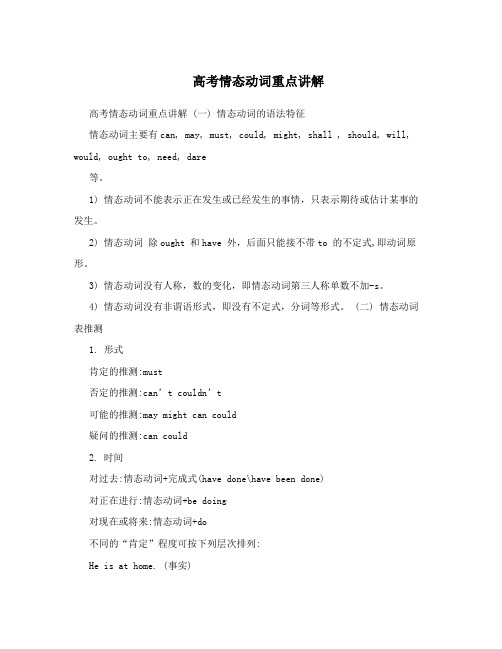
高考情态动词重点讲解高考情态动词重点讲解 (一) 情态动词的语法特征情态动词主要有can, may, must, could, might, shall , should, will, would, ought to, need, dare等。
1) 情态动词不能表示正在发生或已经发生的事情,只表示期待或估计某事的发生。
2) 情态动词除ought 和have 外,后面只能接不带to 的不定式,即动词原形。
3) 情态动词没有人称,数的变化,即情态动词第三人称单数不加-s。
4) 情态动词没有非谓语形式,即没有不定式,分词等形式。
(二) 情态动词表推测1. 形式肯定的推测:must否定的推测:can’t couldn’t可能的推测:may might can could疑问的推测:can could2. 时间对过去:情态动词+完成式(have done\have been done)对正在进行:情态动词+be doing对现在或将来:情态动词+do不同的“肯定”程度可按下列层次排列:He is at home. (事实)He must be at home.(非常肯定的推断)He could be at home.(很可能)He ought to be at home.(很可能)He may be at home.(仅仅可能而已)He might be at home.(或许, 非常不确定)He might not be at home.(也许不在家)He may not be at home. (比might可能)He couldn’t be at home.(很可能不在家)He can’t be at hom e.(一定不在家)He isn't at home.(事实)(三) 高考常用情态动词辨析1. can\ could\ be able to表示能力can和be able to都表示能力(Ability),意思上没多大区别。
高中英语知识点归纳情态动词的用法与义项
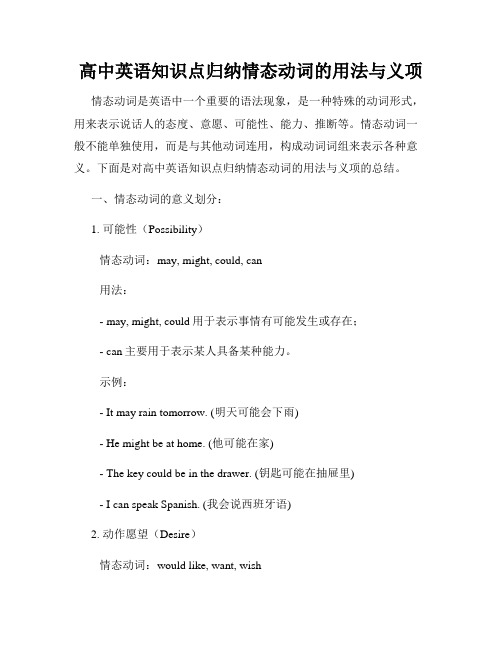
高中英语知识点归纳情态动词的用法与义项情态动词是英语中一个重要的语法现象,是一种特殊的动词形式,用来表示说话人的态度、意愿、可能性、能力、推断等。
情态动词一般不能单独使用,而是与其他动词连用,构成动词词组来表示各种意义。
下面是对高中英语知识点归纳情态动词的用法与义项的总结。
一、情态动词的意义划分:1. 可能性(Possibility)情态动词:may, might, could, can用法:- may, might, could用于表示事情有可能发生或存在;- can主要用于表示某人具备某种能力。
示例:- It may rain tomorrow. (明天可能会下雨)- He might be at home. (他可能在家)- The key could be in the drawer. (钥匙可能在抽屉里)- I can speak Spanish. (我会说西班牙语)2. 动作愿望(Desire)情态动词:would like, want, wish用法:- would like用于表示客气地提出请求或愿望;- want用于表示强烈的需求或欲望;- wish用于表示遗憾或对现在情况的不满或希望。
示例:- I would like to have a cup of coffee. (我想来一杯咖啡)- She wants to go shopping. (她想去购物)- I wish I had more free time. (我希望我有更多的空闲时间) 3. 推测与推断(Speculation)情态动词:must, may, might用法:- must用于表示说话人根据某种依据做出肯定的推测; - may, might用于表示可能性的推测。
示例:- It must be raining outside. (外面肯定在下雨)- He may/might be busy right now. (他可能正忙)4. 动作能力(Ability)情态动词:can, could用法:- can表示某人具备某种能力;- could表示过去的能力或给予请求、许可的非正式方式。
高中英语语法专题情态动词与常考短语
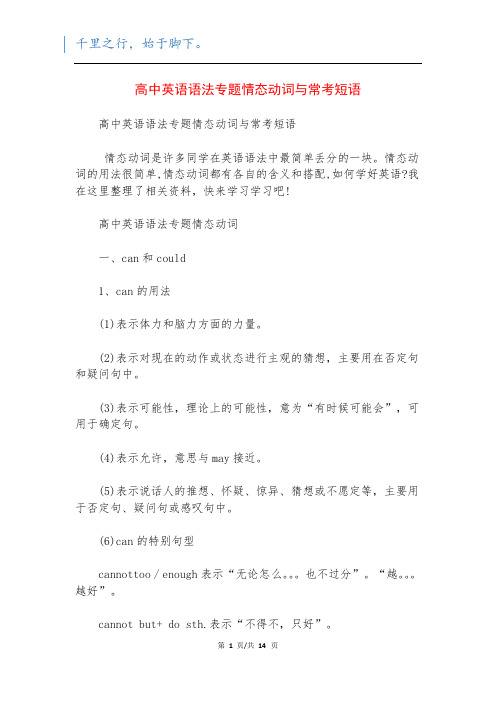
高中英语语法专题情态动词与常考短语高中英语语法专题情态动词与常考短语情态动词是许多同学在英语语法中最简单丢分的一块。
情态动词的用法很简单,情态动词都有各自的含义和搭配,如何学好英语?我在这里整理了相关资料,快来学习学习吧!高中英语语法专题情态动词一、can和could1、can的用法(1)表示体力和脑力方面的力量。
(2)表示对现在的动作或状态进行主观的猜想,主要用在否定句和疑问句中。
(3)表示可能性,理论上的可能性,意为“有时候可能会”,可用于确定句。
(4)表示允许,意思与may接近。
(5)表示说话人的推想、怀疑、惊异、猜想或不愿定等,主要用于否定句、疑问句或感叹句中。
(6)can的特别句型cannottoo / enough表示“无论怎么。
也不过分”。
“越。
越好”。
cannot but+ do sth.表示“不得不,只好”。
2、could的用法(1)表示力量,指的是过去时间。
(2)表示允许,指的是过去时间。
(3)表示可能,可以指过去时间,也可以指现在时间,表示语气缓和。
(4)委婉客气地提出问题或陈述看法,指的是现在时间。
主要用于疑问句,回答时用can。
3、can与could的区分can表推想时只用于否定句和疑问句(could无此限制)。
couldnt 的可能性比cant小。
4、can与be able to的区分(1)现在时:无区分,但后者不常用。
(2)完成时;can没有完成时,此时要用have(has,had)been able to。
(3)将来时:can没有将来时,要用will be able to。
(4)过去时:could表示一般力量,was/were able to 表示在详细场合通过努力胜利做成某事的力量。
二、may 和might1、may的用法(1)表示询问或说明一件事可不行以做。
(2)表示一件事或许会发生或某种状况可能会存在,通常用在确定句和否定句中。
留意:表示可能性时,cant语气强,表示“不行能”,may not 语气弱,表示“可能不”。
高一常见知识点梳理情态动词与情态副词
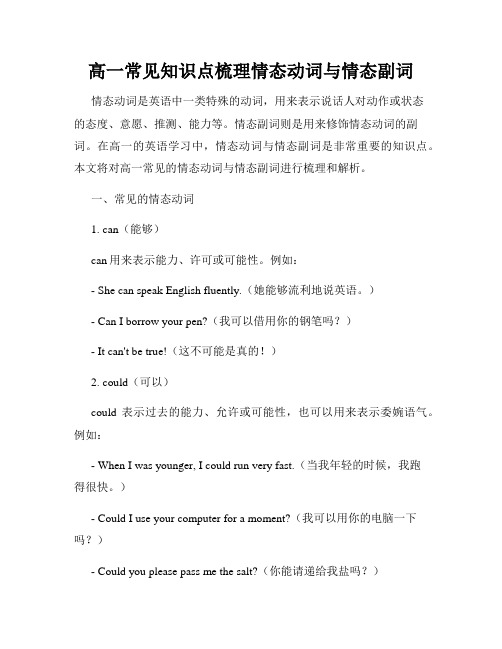
高一常见知识点梳理情态动词与情态副词情态动词是英语中一类特殊的动词,用来表示说话人对动作或状态的态度、意愿、推测、能力等。
情态副词则是用来修饰情态动词的副词。
在高一的英语学习中,情态动词与情态副词是非常重要的知识点。
本文将对高一常见的情态动词与情态副词进行梳理和解析。
一、常见的情态动词1. can(能够)can用来表示能力、许可或可能性。
例如:- She can speak English fluently.(她能够流利地说英语。
)- Can I borrow your pen?(我可以借用你的钢笔吗?)- It can't be true!(这不可能是真的!)2. could(可以)could表示过去的能力、允许或可能性,也可以用来表示委婉语气。
例如:- When I was younger, I could run very fast.(当我年轻的时候,我跑得很快。
)- Could I use your computer for a moment?(我可以用你的电脑一下吗?)- Could you please pass me the salt?(你能请递给我盐吗?)3. may(可能)may表示可能性、允许或请求的委婉语气。
例如:- It may rain tomorrow, so take your umbrella with you.(明天可能会下雨,所以记得带上雨伞。
)- May I go to the bathroom?(我可以去洗手间吗?)- May I have another piece of cake, please?(请问我可以再来一块蛋糕吗?)4. might(可能)might用来表示较小的可能性或建议。
例如:- It might rain later, so you should bring a raincoat.(天气可能会下雨,所以你应该带一件雨衣。
)- You might want to try the new restaurant downtown.(你可以试试市区的那家新餐厅。
高中英语 情态动词用法归纳(全)(共63张PPT)

总结归纳
考点一 can ,may, must 等情态动词在陈述句中的用法
1. can 的用法 (1)表示能力、许可、可能性。 表示能力时一般译为“能、会”, 即
有种能力,尤其是生来具备的能力,此时may 和must 均不可代替它。 如:
She can swim fast, but I can’t . 她能游得很快,但我不能。 I can see with my eyes. 我用眼睛看。 (2) 表示可能、能够。 如: I can finish it in an hour. 我能在一小时后完成它。 (3)表示许可,常在口语中。如: You can use my dictionary. 你可以用我的字典。 (4) 表示推测,意为“可能”, 常用于否定句和疑问句中, 此时 can’t 译为“ 不可能”。 如: Can the news be true? 这个消息会是真的吗?
2. He doesn’t dare (to) answer.
3. He needs to finish his homework today.
五、 shall, should
1) shall 用于第一人称,征求对方的意见。
What shall we do this evening?
2) shall 用于第二、三人称,表示说话人给对方的命令、警告、 允诺或威胁。
must 表示主观看法,意为“必须、应该” 表示有把握的推测,用语肯定句
Need 表示需要、必须,主要用于否定句和疑问句中 dare 表示敢于,主要用于否定句和疑问句中 should 意为“ 应该”, 表示要求和命令
表示劝告、建议 had better 意为 “最好”,表示建议 used to 意为 “过去常常,表示过去的动作、行为
15 情态动词-高中英语语法记忆框架版(精编)
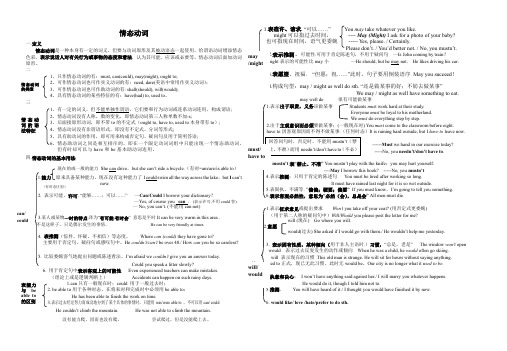
情态动词一.定义情态动词是一种本身有一定的词义,但要与动词原形及其被动语态一起使用,给谓语动词增添情态色彩,表示说话人对有关行为或事物的态度和看法,认为其可能、应该或必要等。
情态动词后面加动词原形。
二1、只作情态动词的有:must, can(could), may(might), ought to;2、可作情态动词也可作实义动词的有:need, dare(美语中常用作实义动词);3、可作情态动词也可作助动词的有: shall(should), will(would);4、具有情态动词的某些特征的有:have(had) to, used to 。
三1、有一定的词义,但不能单独作谓语,它们要和行为动词或连系动词连用,构成谓语;2、情态动词没有人称,数的变化,即情态动词第三人称单数不加-s;3、后面接原形动词,即不带to的不定式(ought to, have to, used to 本身带有to );4、情态动词没有非谓语形式,即没有不定式、分词等形式;5、具有助动词的作用,即可用来构成否定句、疑问句及用于简明答语;6但有时却可以与have 和be 基本助动词连用。
四.情态动词的基本用法She can drive ,but she can’t ride a bicycle.(有时=am/are/is able to ) I could swim all the way across the lake ,but I can’tnow. . “能够……;可以……” —Can/Could I borrow your dictionary ? —Yes, of course you can .(表示许可,不用could 答) — No, you can’t. (不能用can not) ,译为“有可能,有时会” 意思是平时It can be very warm in this area .。
He can be very friendly at times.Where can (could) they have gone to? He couldn’t/can’t be over 40./ How can you be so careless? I’m afraid we couldn’t give you an answer today. Could you speak a litter slowly?6. 用于肯定句中表示客观上的可能性 Even experienced teachers can make mistakes.(理论上或是逻辑判断上) Accidents can happen on such rainy days.1.can 只有一般现在时;could 用于一般过去时;2. be able to 用于各种时态,在将来时和完成时中必须用be able to ; He has been able to finish the work on time.3.表示过去经过努力而成功地办到了某个具体的事情时,只能用was/were able to ,不可以用can/ could He couldn’t climb the mountain. He was not able to climb the mountain.. “可以……” You may take whatever you like.might 可以指过去时间, ---- May (Might) I ask for a photo of your baby?----- Yes, please. / Certainly.Please don’t. / You’d better not. / No, you mustn’t.表示推测.,可能性.可用于肯定陈述句,不用于疑问句 —Is John coming by train ? 表示的可能性比may 小 —He should, but he may not . He likes driving his car . 表愿望、祝福. “但愿;祝……”此时,句子要用倒装语序 May you succeed !构成句型:may / might as well do sth. “还是做某事的好;不妨去做某事” We may / might as well have something to eat. may well do 很有可能做某事mus t work hard at their study.must be loyal to his motherland.do everything step by step. ) You must come to the classroom before eight. It is raining hard outside, but I have to leave now. ------Must we hand in our exercise today?-----No, you needn’t/don’t have to . ;you may hurt yourself.-----No, you mustn’t,I’m going to tell you something. ” All men must die.征求意见或提出要求 Won’t you take off your coat? (用否定式更委婉) Will/Would you please post the letter for me?will (现在) Go where you will.would(过去) She asked if I would go with them./ He wouldn’t help me yesterday. 表示固有性质,某种倾向(用于非人主语时.)习惯,“总是,老是” The window won't open 表示过去反复发生的动作或倾向 When he was a child, he would often go skiing. will 表示现在的习惯 This old man is strange. He will sit for hours without saying anything.正式,现已无此习惯。
高考英语语法专攻-《情态动词》-考点归纳+针对性练习
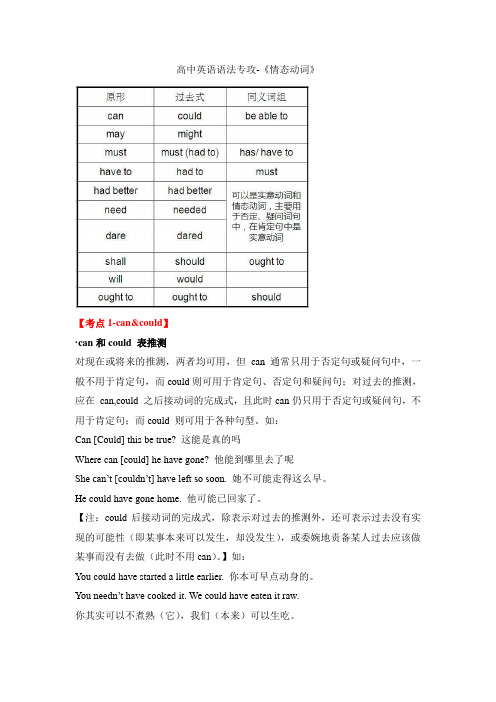
高中英语语法专攻-《情态动词》【考点1-can&could】·can和could 表推测对现在或将来的推测,两者均可用,但can 通常只用于否定句或疑问句中,一般不用于肯定句,而could则可用于肯定句、否定句和疑问句;对过去的推测,应在can,could 之后接动词的完成式,且此时can仍只用于否定句或疑问句,不用于肯定句;而could 则可用于各种句型。
如:Can [Could] this be true? 这能是真的吗Where can [could] he have gone? 他能到哪里去了呢She can’t [couldn’t] have left so soon. 她不可能走得这么早。
He could have gone home. 他可能已回家了。
【注:could后接动词的完成式,除表示对过去的推测外,还可表示过去没有实现的可能性(即某事本来可以发生,却没发生),或委婉地责备某人过去应该做某事而没有去做(此时不用can)。
】如:You could have started a little earlier. 你本可早点动身的。
You needn’t have co oked it. We could have eaten it raw.你其实可以不煮熟(它),我们(本来)可以生吃。
·can和could表允许表示现在的允许时,若是请求别人允许自己做某事,两者均可用,但用could 语气更委婉;若是自己允许别人做某事,一般只用can,而不用could。
如:Can [Could] I come in? 我可以进来吗“Could [Can] I use your pen? ” “Yes,of course you can.”“我可以借用你的钢笔吗?”“当然可以。
”(不能说Yes,you could.)表示过去的允许时,若表示过去一般性允许(即表示某人随时都可以做某事),用could;若表示在过去某一特定情况下允许进行某一特定的活动,则不用could。
高中英语情态动词的常用用法归纳(超详细)
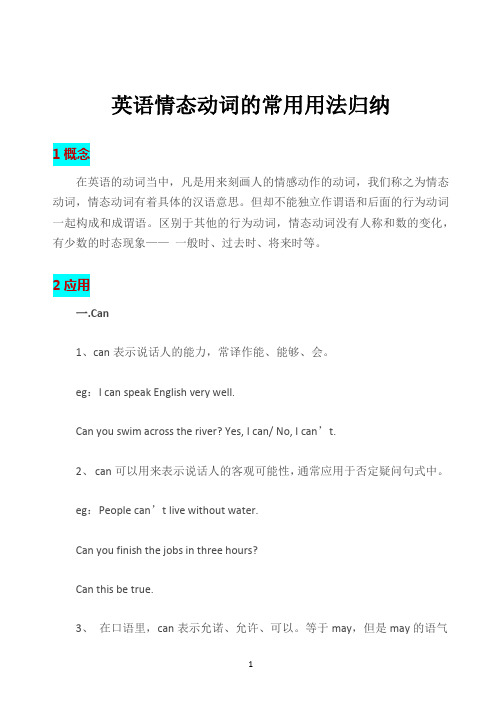
英语情态动词的常用用法归纳1概念在英语的动词当中,凡是用来刻画人的情感动作的动词,我们称之为情态动词,情态动词有着具体的汉语意思。
但却不能独立作谓语和后面的行为动词一起构成和成谓语。
区别于其他的行为动词,情态动词没有人称和数的变化,有少数的时态现象——一般时、过去时、将来时等。
2应用一.Can1、can表示说话人的能力,常译作能、能够、会。
eg:I can speak English very well.Can you swim across the river? Yes, I can/ No, I can’t.2、can可以用来表示说话人的客观可能性,通常应用于否定疑问句式中。
eg:People can’t live without water.Can you finish the jobs in three hours?Can this be true.3、在口语里,can表示允诺、允许、可以。
等于may,但是may的语气重于can。
eg:Can I come in? = May I come in?Can I use your bike? = May I use your bike ?*表示允许可以may mightcould can4、在“过去时”的语境里,通常用could 表示它的过去式,用be able to 短语(was/were)而could通常用来在一般现在时的语境里表示委婉语气eg:Could(can)you show me the way to the supermarket?5、can表示猜测(1)对现在状态的一种猜测,只能用在否定疑问句中。
eg:Zhang can’t be ill really?This can’t be done by him.(2)对现在动作的猜测eg: The boy can’t be telling lies.Mary works so hard, now, she can’t be sleeping.(3)对过去动作的一种猜测eg:He can’t have gone to the bookshop yesterday.Mother couldn’t have said it.6、can(could)惯用法(1)can’t wait to do 迫不及待做…….eg: Children can’t wait to eat apples in the basket.(2)can’t help doing 情不自禁做某事。
高中英语语法之情态动词
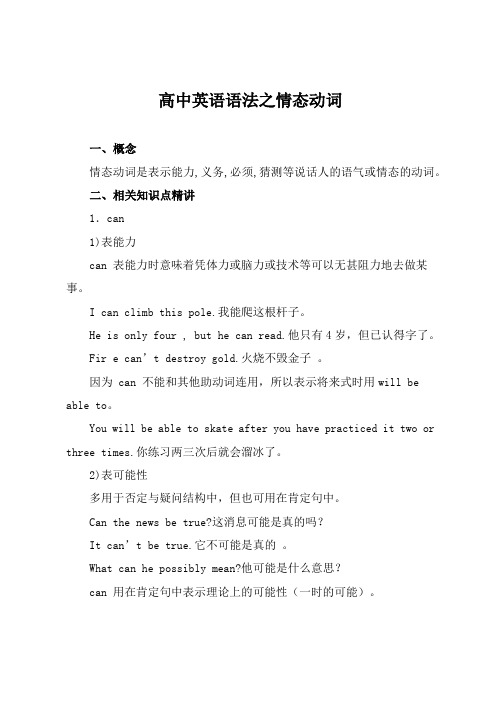
高中英语语法之情态动词一、概念情态动词是表示能力,义务,必须,猜测等说话人的语气或情态的动词。
二、相关知识点精讲1.can1)表能力can 表能力时意味着凭体力或脑力或技术等可以无甚阻力地去做某事。
I can climb this pole.我能爬这根杆子。
He is only four , but he can read.他只有4岁,但已认得字了。
Fir e can’t destroy gold.火烧不毁金子。
因为 can 不能和其他助动词连用,所以表示将来式时用will be able to。
You will be able to skate after you have practiced it two or three times.你练习两三次后就会溜冰了。
2)表可能性多用于否定与疑问结构中,但也可用在肯定句中。
Can the news be true?这消息可能是真的吗?It can’t be true.它不可能是真的。
What can he possibly mean?他可能是什么意思?can 用在肯定句中表示理论上的可能性(一时的可能)。
Attending the ball can be very exciting.The road can be blocked.这条路可能会不通的。
may 在肯定句中表示现实的可能性。
The road may be blocked.这条路可能不通了。
3)表示允许(和 may 意思相近)常见于口语。
Can (May) I come in ?我能进来吗?Can I smoke here ?我可以在这里抽烟吗?2.could 的用法1)表过去的可能和许可,(多用于间接引语中)At that time we thought the story could not be true.那时我们认为所说的事不可能是真的。
Father said I could swim in the river.爸爸说我可以在河里游泳。
高中英语知识点归纳情态动词与情态副词的特殊用法

高中英语知识点归纳情态动词与情态副词的特殊用法情态动词和情态副词在英语语法中扮演着重要的角色。
它们不仅能够表达说话者的态度和情感,还能够传达一些特殊的意义和信息。
在高中英语学习中,学生们需要对情态动词和情态副词的特殊用法有所了解。
本文将对高中英语中常见的情态动词和情态副词特殊用法进行归纳总结。
一、情态动词的特殊用法1. 表示推测和可能性情态动词can、could、may、might、must、should等可以用于表示对某种情况的推测和可能性。
例如:- He can be at home.(他可能在家。
)- It must be raining outside.(外面一定在下雨。
)2. 表示许可和请求表示许可的情态动词有can、could、may,表示请求的情态动词有can、could、may、would。
例如:- Can I go to the restroom?(我可以去洗手间吗?)- Could you please help me with my homework?(你能帮我做作业吗?)3. 表示能力和能够情态动词can和could可以表示能力和能够的意思。
例如:- She can speak three languages.(她能说三种语言。
)- Could you play the piano when you were a child?(小时候你会弹钢琴吗?)4. 表示义务和必要性情态动词must和should可以表示义务和必要性。
例如:- You must finish your homework before going out.(出去之前你必须完成作业。
)- She should apologize for what she said.(她应该为她说的话道歉。
)二、情态副词的特殊用法1. 表示程度和强调情态副词really、very、extremely等可以用于表示程度和强调。
高中英语2025届高考语法复习情态动词与虚拟语气知识讲解
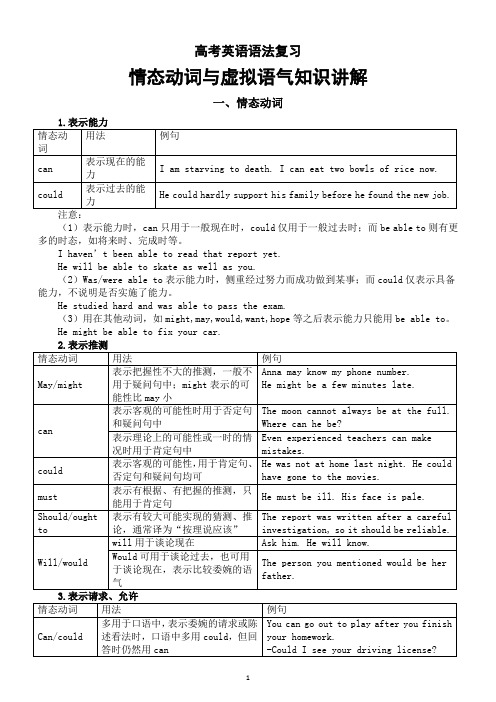
高考英语语法复习情态动词与虚拟语气知识讲解一、情态动词(1)表示能力时,can只用于一般现在时,could仅用于一般过去时;而be able to则有更多的时态,如将来时、完成时等。
I haven’t been able to read that report yet.He will be able to skate as well as you.(2)Was/were able to表示能力时,侧重经过努力而成功做到某事;而could仅表示具备能力,不说明是否实施了能力。
He studied hard and was able to pass the exam.(3)用在其他动词,如might,may,would,want,hope等之后表示能力只能用be able to。
He might be able to fix your car.(1)must还可以表示质问或感情色彩,意为“偏要,偏偏”。
Why must it snow on Saturday?(2)should还可以表示惊奇、愤怒、失望等特殊情感,尤其用在以why,who,how等开头的疑问句中或某些感叹句中。
why should you be so late today?(1)must作“必须”讲的一般疑问句,其肯定回答用must,否定回答用needn’t或don’t have to。
-Must I pay now?-Yes, you must./No, you needn’t.(2)need还可以作实义动词,有人称和数的变化,后跟带to的不定式作宾语。
She needed to go out for a walk.(1)两者在表示过去的习惯动作或行为时常可通用。
When we were children, we would/used to go skating every winter.(2)Used to与would都不能与表示具体频率、次数的词及特定的时间状语或具体的一段时间连用。
高中英语情态动词详细讲解及例句
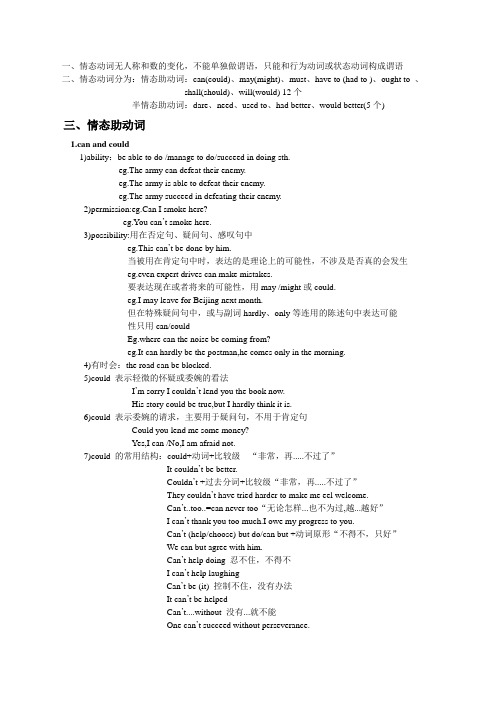
一、情态动词无人称和数的变化,不能单独做谓语,只能和行为动词或状态动词构成谓语二、情态动词分为:情态助动词:can(could)、may(might)、must、have to (had to )、ought to 、shall(should)、will(would) 12个半情态助动词:dare、need、used to、had better、would better(5个)三、情态助动词1.can and could1)ability:be able to do /manage to do/succeed in doing sth.eg.The army can defeat their enemy.eg.The army is able to defeat their enemy.eg.The army succeed in defeating their enemy.2)permission:eg.Can I smoke here?eg.You can’t smoke here.3)possibility:用在否定句、疑问句、感叹句中-eg.This can’t be done by him.当被用在肯定句中时,表达的是理论上的可能性,不涉及是否真的会发生eg.even expert drives can make mistakes.要表达现在或者将来的可能性,用may /might或could.eg.I may leave for Beijing next month.但在特殊疑问句中,或与副词hardly、only等连用的陈述句中表达可能性只用can/couldEg.where can the noise be coming from?eg.It can hardly be the postman,he comes only in the morning.4)有时会:the road can be blocked.5)could 表示轻微的怀疑或委婉的看法I’m sorry I couldn’t lend you the book now.His story could be true,but I hardly think it is.6)could 表示委婉的请求,主要用于疑问句,不用于肯定句Could you lend me some money?Yes,I can /No,I am afraid not.7)could 的常用结构:could+动词+比较级“非常,再.....不过了”It couldn’t be better.Couldn’t +过去分词+比较级“非常,再.....不过了”They couldn’t have tried harder to make me eel welcome.Can’t..too..=can never too“无论怎样...也不为过,越...越好”I can’t thank you too much.I owe my progress to you.Can’t (help/choose) but do/can but +动词原形“不得不,只好”We can but agree with him.Can’t help doing 忍不住,不得不I can’t help laughingCan’t be (it) 控制不住,没有办法It can’t be helpedCan’t....without 没有...就不能One can’t succeed without perseverance.2.may and might1)permission:May I use your pen?Yes,you may./No,you may not.2)Possibility:用于推测,表示不确定,不用于疑问句中She may know Tom’s address.出现I’m afraid.I’m not sure等表示不确定时,常用may/might.I’m afraid he might not come to attend the meeting today.从语气上判断,may表示的可能性比might 大,might更多的表示怀疑He may be very busy now.He might be very busy now.3)用于让步状语从句中However hard you may study,you cannot master English in a month.4)用于祈使句,表示祝愿May you succeed!5)might 常用于表示轻微的责备和委婉的请求You might post the letter for me if you are going near a post box.You might have let me know before!6)习惯用法:may as well do”理所当然,有足够的理由”She may be proud of her sonMay /might (just) as well do=had better do(最好)You might as well stay at home tonight.May/might as well+do A+as+do+B”与其做B不如做A”You might as well throw the money away as lend it to him.One may as well not know a thing at all as know it but imperfectly3.must and have to1)表示义务,一定要,必须You must arrive in good time.The meeting is very important.2)表示肯定性或难以避免,必然会,肯定会All men must die.3)must 表示有把握的推测,一定是,准时Must do/must be doing/must have doneThe tall fellow must be a basketball player.Let’s have something.You must be starving.He must have received mu letter which has mailed last week.4)must 表示非要,偏要,常以第二人称为主语,意指不耐或令人不愉快的事情,用于其他人称,表示主语固执,意为偏偏Why must you buy that car?Jane was never a pleasant young girl.After you gave her your advice,she must goand do the opposite.5)must 的三种否定形式表示不可能must be --can’t be must have done--can’t have doneYou must have met him before.You can’t have met him before.表示不必must do--need not to/don’t have toWe must get up at six tomorrow morning.We don’t have to get up at six tomorrow morning.表示决不能,严禁must--mustn’tYou mustn’t park your car here.6)回答以must提问的句子Must we clean all the rooms?Yes ,you must/No ,you don’t have to/No ,you needn’t7)must 可做名词,表示必须有的东西,必须做的事Warm clothes are a must in the mountains.8)must和have to 表示必须时,有一下差别Must 表示的是说话人主观的看法,而have to则往往强调客观需要The play is not interesting ,I really must go now.I have to work when I was your age.Must 一般只表现在,have to 则有更多的时态。
高中英语语法情态动词
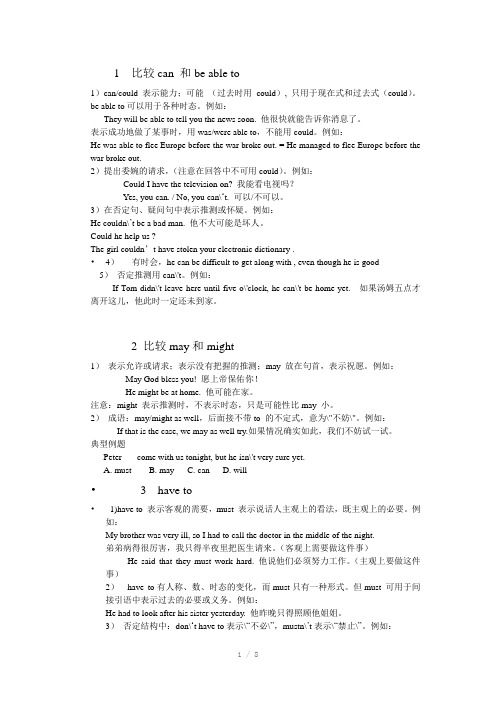
1 比较can 和be able to1)can/could 表示能力;可能(过去时用could), 只用于现在式和过去式(could)。
be able to可以用于各种时态。
例如:They will be able to tell you the news soon. 他很快就能告诉你消息了。
表示成功地做了某事时,用was/were able to,不能用could。
例如:He was able to flee Europe before the war broke out. = He managed to flee Europe before the war broke out.2)提出委婉的请求,(注意在回答中不可用could)。
例如:--- Could I have the television on? 我能看电视吗?--- Yes, you can. / No, you can\‘t. 可以/不可以。
3)在否定句、疑问句中表示推测或怀疑。
例如:He couldn\’t be a bad man. 他不大可能是坏人。
Could he help us ?The girl couldn’t have stolen your electronic dictionary .•4)有时会,he can be difficult to get along with , even though he is good 5)否定推测用can\'t。
例如:If Tom didn\'t leave here until five o\'clock, he can\'t be home yet.如果汤姆五点才离开这儿,他此时一定还未到家。
2 比较may和might1)表示允许或请求;表示没有把握的推测;may 放在句首,表示祝愿。
例如:May God bless you! 愿上帝保佑你!He might be at home. 他可能在家。
高中英语语法 情态动词用法总结(20张PPT)-经典通用课件资料
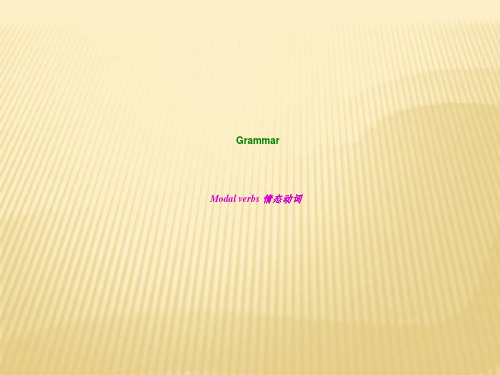
A. could B. would C. should D. might
C
2. What do you mean, there are only ten tickets? There_____
A. should CA. will
B. would D. shall
be twelve.
2021/10/10
13
5. must
1. 表示义务或强烈的劝告,意为“必须”“应该”, 其否定式表示“不应该”“不许可” “不准”“禁止”。
Eg: 1) You must finish your homework first. 2) Children mustn’t speak like that to their parents.
3. 表推测,用于肯定句,意为“一定”“务必”。
Eg: 1) Betty must be in the next room. 2) He must be watering the flowers in his garden.
2021/10/10
14
Complete the following sentences using modal verbs.
5) Can/Could I use your dictionary? 6) Could you lend me a hand?
3. 表示“请求” “允许”(表请求时,口语中常用 could 代替 can 使语气更委婉,回答时用can)
2021/10/10
4
4. 表示“许可”,可与may 换用。 You can go home now.
1. 表“请求、建议”等,用 would 比用will 委婉,客气些 Eg: 1)Will you lend me your book? 2) Would you like a cup of tea?
- 1、下载文档前请自行甄别文档内容的完整性,平台不提供额外的编辑、内容补充、找答案等附加服务。
- 2、"仅部分预览"的文档,不可在线预览部分如存在完整性等问题,可反馈申请退款(可完整预览的文档不适用该条件!)。
- 3、如文档侵犯您的权益,请联系客服反馈,我们会尽快为您处理(人工客服工作时间:9:00-18:30)。
考点识别:情态动词为必修三的语法点,从近几年的高考情况看,对情态动词的考查为高考重点项目之一,高考的热点依次为:推测和能力,必要性,请求建议命令,所以要求考生准确把握情态动词的意义和用法。
一、表推测词形肯定否定must 必然;一定—should 按说应该应该不会ought to 按说应该应该不会can/could 可能/微弱的可能不可能may/might 也许/微弱的可能可能不会技巧:做到情态动词表示推测的题,一定要把题目读完,根据题目所提供的信息判断填空部分所需要的语气。
e.g. He must be the wanted man, for he’s exactly like this picture.(因为他和照片很像,能够判断出语气是很肯定的)(2011 北京,24)—I don’t really like James. Why did you invite him?—Don’t worry. He come. He said he wasn’t certain what his plans were.A. must notB. need notC. would notD. might not二、表能力can:表示现在的能力could:表示过去的能力be able to will be able to: 将来的能力was/were able to:过去有能力并且成功地做了某事技巧:这三个词不易混淆,所以做此类题时,一般通过翻译就能选出答案。
但是要注意题目的时态。
e.g. (2010全国II, 17) I’m afraid Mr. Harding A see you now. He is busy.A. can’tB. mustn’tC. shouldn’tD. needn’t不能(2011 四川,20) The police still haven’t found the lost child, but they’re doing all they A .A. canB. mayC. mustD. should三、表必要性must: 一定,必须mustn’t: 不准,强行禁止have to: 不得不don’t have to: 不必need: 需要needn’t: 不需要e.g. (2011 上海,28) I D worry about my weekend—I always have my plans ready before it comes.A. can’tB. mustn’tC. daren’tD. needn’t不需要四、表请求、建议、命令、允许、禁止1.表示请求、建议:用于一、三人称,表示征求对方意见。
may/might:表示允许、请求。
will/would:用于第二人称,表示请求或建议。
e.g. Shall the driver wait outside?司机在外边等着可以吗?2.表示命令、允诺must 必须mustn’t 禁止;不准should/ought to 应该shouldn’t/oughtn’t to 不应该(易错点) shall:常与二、三人称连用,表命令、警告、威胁、允诺。
will:表示意愿、决心。
e.g.(2011 陕西卷)——Will you read me a story, Mummy?——OK. You _D_ have one if you go to bed as soon as possible.A. mightB. mustC. couldD. shall(允诺)情态动词+ have done一般考试时,常与虚拟语气连用来作为考点。
翻译该句型时,加个“本”字即可。
情态动词+ have done 用法例句must have done 一定/准是/想必做了It must have rained last night, forthe road is quite muddy.can/could have done 本来能够做Can he have gone to his aunt’shome?cannot/couldn’t have done 过去不可能做了He cannot have forgotten theaccident.may/might have done 也许/或许已经做了It’s too late. I think he may havegone to bed.should/ought to have done 本该做而实际上未做You ought to have done thisexercise more carefully.shouldn’t/oughtn’t to have done 本不该做而实际上做了You shouldn’t have told her thetruth.needn’t have done 本不必做而做了You needn’t have taken a taxi here,because it was very near to myhouse.had better(not)have done 当时最好做了(没做) You had better have finished it ontime.would rather(not)have done 宁愿当时做了(没做)I raised objections at the meeting,but now I would rather not havedone that.would like/love to have done 过去愿意做但未做成I would love to have gone to theparty last night, but I had to workextra hours to finish a report.e.g. (2008, 江苏,35)—I’m sorry. I B at you the other day.—Forget it. I was a bit out of control myself.A. shouldn’t shoutB. shouldn’t have shoutedC. mustn’t shoutD. mustn’t have shouted易错点:1. cannot but+ do sth :不得不/只好做某事e.g. I cannot but choose to go.另外,表达该意思的其他句型有:can’t help but docan’t choose but docan do nothing but dohave no choice but do2. may as well + do: 最好,倒不如e.g. You may as well do it at once.3. should还可用在if 引导的条件状语从句中,表示“万一”e.g. (09天津15) This printer is of good quality. If it _B_ break down within the first year, we would repair it at our expense.A. wouldB. shouldC. couldD. might万一“Why/How should” ,表示说话人对某事不能理解,感到惊讶,意为“竟会”e.g. Why should you be so late today? 你今天怎么来得这么晚?4. must 表示“非要,偏要,硬要”e.g. (2011全国卷二)If you __C___ smoke, please go outside. (如果你非要抽烟,请到外面抽)A. canB. shouldC. mustD. may5. dare/need 做情态动词时,后加do,否定式为daren’t/ needn’t +do做实义动词时,后加to do,否定式为don’t/doesn’t/didn’t + to do自我演练1.We have bought so much food now that Suzie won’t be with us for dinner.A.may not B.needn’t C.can’t D.mustn’t2.-____you interrupt now? Can’t you see I’m o n the phone? ----Sorry Sir, but it’s urgent.A. CanB. ShouldC. MustD. Would3. I’m going to Europe on vacation together with John if I _______ find the money.A. canB. mightC. wouldD. need4. It’s quite warm here; we __________turn the heating on yet.A.c ouldn’tB. mustn’tC. needn’tD. wouldn’t5. I use a clock to wake me up because at six o'clock each morning the train comes by myhouse.A. couldn'tB. mustn'tC. shouldn'tD. needn't6. —Will you read me a story, Mummy? --OK. You ________have one if you go to bed as soon as possible.A. mightB. mustC. couldD. shall7. They _____ have arrived at lunch-time but their flight was delayed.A. willB. canC. mustD. should8. If you __ go, at least wait until the storm is over.A. canB. mayC. mustD. will9. It _______be the postman at the door. It is only six o’clock.A. mustn’t B can’t C won’t D needn’t10. Just be patient. You _____ expect the world to change so soon.A .can’tB .needn’tC .may notD .will not11. --- _____ I take the book out? --- I’m afraid not.A. WillB. MayC. MustD. Need12. -I haven’t got the reference book yet, but I’ll have a test on the subject next m onth.--- Don’t worry. You ____ have it by Friday.A .could B. shall C .must D. may13. Doctors say that exercise is important for health, but it ____ be regular exercise.A .canB .willC .mustD .may14. I have told you the truth. _____ I keep repeating it?A. MustB. Can C .May D .Will15. I’m afraid Mr. Harding _____ see you now. He’s busy.A .can’t B. mustn’t C .shouldn’t D .needn’t。
